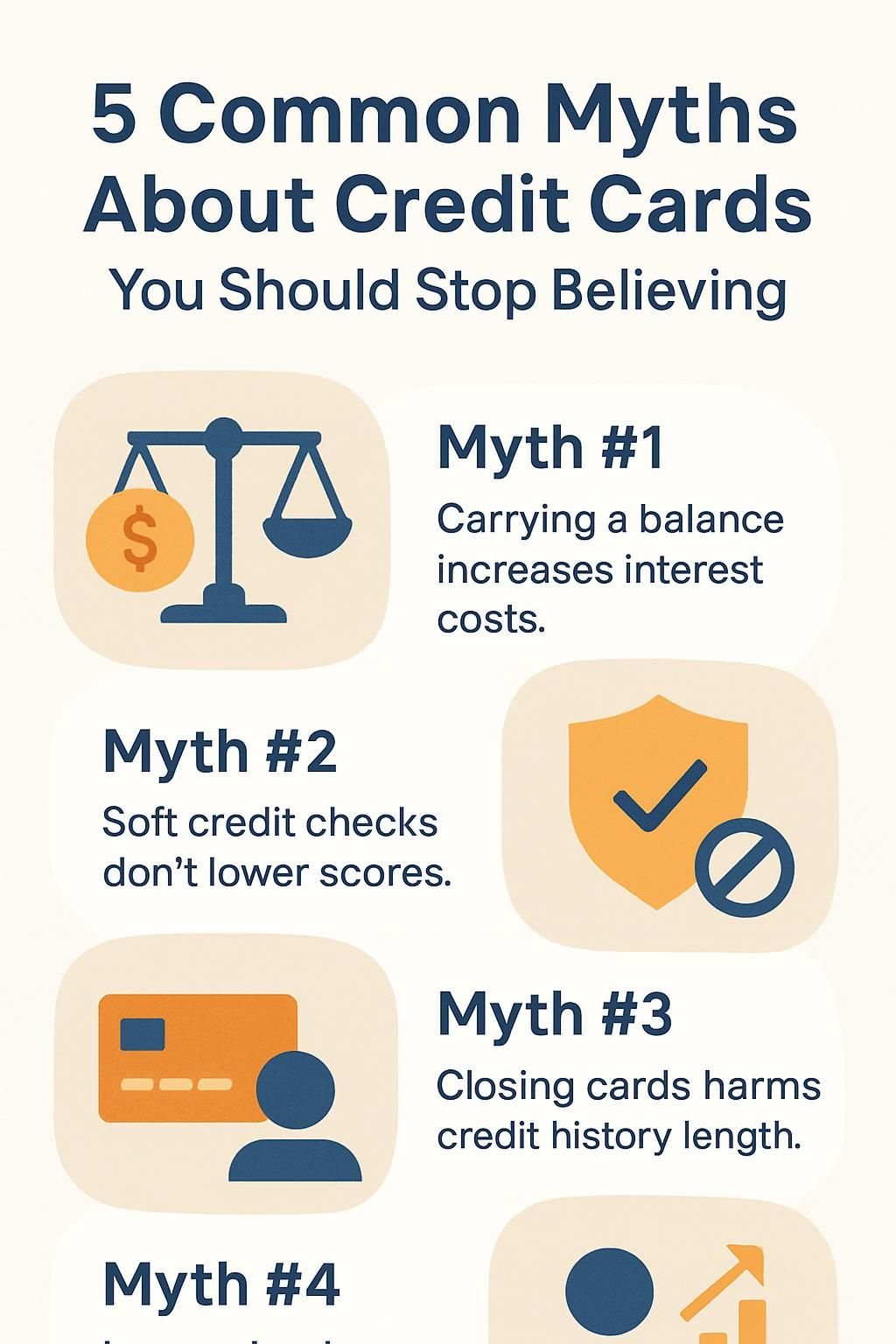5 Common Myths About Credit Cards You Should Stop Believing
Many people feel confused by credit card myths that can hurt their credit score and financial goals. Studies show that misinformation about topics like carrying a balance or closing accounts still affects even those with high incomes and multiple bank credit cards.
This article clears up five common misconceptions, making it easier for you to use your credit cards wisely and protect your credit history. Find out which ideas are costing you money or rewards today.
Key Takeaways
- Carrying a credit card balance does not improve your credit score; it results in unnecessary interest charges. Financial experts advise keeping the credit utilization ratio below 30% and paying off bills in full each month to boost scores without accruing high-interest costs.
- Checking your own credit score through soft inquiries doesn’t lower it, contrary to common belief. It is essential for monitoring for errors or potential fraud, with hard inquiries by lenders being the ones that can slightly affect the score.
- Closing a credit card can negatively impact your credit score by increasing your credit utilization ratio and shortening the average length of your credit history. Keeping unused cards open, especially older accounts, unless they carry costly annual fees outweighing benefits, contributes positively to a strong payment history and available lines of revolving credit.
- Income level does not directly influence one’s credit score. Credit scoring models focus on factors like payment history and debt amounts rather than income. However, higher income might assist in obtaining better terms on loans or premium reward cards.
- Owning multiple cards can potentially enhance your “credit mix” and length of history when managed effectively; however, it requires careful management such as making all payments on time to avoid damaging effects on the individual’s financial profile.

Does Carrying a Balance Really Improve Your Credit Score?

Carrying a credit card balance does not help your credit score. Credit bureaus calculate your score using factors like payment history, credit utilization ratio, and length of credit history.
Making only the minimum payment and leaving a balance will actually cost you extra money due to interest charges. Financial institutions such as HDFC Bank or RuPay card providers report on-time payments to the credit bureaus; those timely payments boost your credit record regardless of whether you pay off the statement in full.
Your credit utilization, which is how much debt you carry compared to your total line of credit, affects about 30% of most scoring models. Experts recommend keeping this ratio below 30%.
Paying off your entire bill each month helps improve your score without incurring high-interest rates that eat into wealth-building efforts. Banks and lenders like seeing zero missed payments instead of outstanding debts carried from month to month.
Can Checking Your Credit Score Lower It?
While some believe carrying a balance helps your credit score, misunderstandings like this also surround credit checks. Each time you check your own credit report or pull up your current credit score through banking apps, it counts as a soft inquiry.
Soft inquiries do not impact your credit scores at all. You can review your credit report from major bureaus such as Equifax, Experian, and TransUnion as often as you like without penalty.
Many people confuse soft inquiries with hard inquiries, which lenders make when you apply for a new loan or additional lines of credit. Only hard pulls may chip away at your score slightly because they suggest new borrowing activity.
For example, applying for four different rewards cards in one week could lead to an eight-to-ten point drop on most scoring models. My experience with checking my own reports every quarter has never resulted in a lower score; it just keeps me alert for errors or potential fraud on my accounts and ensures I catch any missed payments early before they affect my finances.
Keeping tabs on your file is wise financial advice whether you’re monitoring cash back incentives or planning future lending moves involving personal loans or mortgages.
https://www.youtube.com/watch?v=IEoaTaX6VbE
Does Closing a Credit Card Improve Your Credit Score?
Checking your credit score does not lower it, yet closing a credit card can trigger several changes to your credit report. Closing an account may decrease your available credit limit and increase your credit utilization ratio.
This often results in a drop in your credit score, even for individuals with significant assets.
A longer length of credit history helps boost scores. If you close an older card, you risk shortening this timeline on your reports. According to Experian, FICO considers both the average age of all accounts and how much total borrowing power you have left open.
As financial advisor Suze Orman notes,.
Keep unused cards open unless the annual fee outweighs any benefit.
Consider factors like annual fees or security risks before deciding to shut down a card. Even if you pay every bill on time, removing access to multiple lines can reduce some benefits tied directly to strong payment history and available lines of revolving credit.
https://www.youtube.com/watch?v=UcWqixdQk30
Does Higher Income Mean a Better Credit Score?
Closing a credit card affects factors like your credit utilization ratio and length of credit history, but income does not play the same direct role in calculating your credit score.
Credit scoring models such as FICO and VantageScore focus on payment history, amount owed, length of credit history, types of accounts (credit mix), and new inquiries from financial tools like loans or cards.
A higher income may help you qualify for premium cards with generous reward points or a larger line of credit. Still, earning more money will not directly boost your score unless you use that extra cash to pay bills on time or lower your debt.
Lenders sometimes look at salary before approving big loans such as a home loan, but they mostly check your repayment habits through data in your credit reports rather than just considering how much money you make.
Is One Credit Card Enough for Good Credit?
High income can help you qualify for higher credit limits, but it does not guarantee a strong credit score. Creditors assess your payment history, how much money you owe, and how well you manage multiple lines of credit.
Owning only one credit card can build good credit if used wisely. Paying your bill on time and keeping your balance low helps your payment history and reduces your credit utilization ratio—two factors that contribute most to your score.
That said, having several cards from different providers like Visa or Mastercard may increase the length of your credit history and improve your “credit mix.” Lenders often view people with a diverse mix of accounts more favorably.
Multiple cards also provide practical benefits such as higher overall available limits, better travel rewards options, and greater protection against fraud. Just continue making on-time payments across all open accounts since missed payments damage even the best profiles.
Understanding Credit Card Rewards Programs
Credit card rewards programs offer perks like cash back, travel points, and discounts on everyday spending, so keep reading to see how you can elevate your lifestyle with the right choices.
What Types of Credit Card Rewards Are Available?
Credit card rewards turn everyday spending into opportunities. These perks make using credit cards more than just a convenient payment method. Here is a list of the types of rewards you can get from using credit cards.
- Cash Back: This is money returned to the cardholder based on the amount they spend. For example, a card might offer 2% cash back on groceries and 3% on gas.
- Travel Miles: Card users earn miles for every dollar spent, which they can redeem for airline tickets, hotel stays, or car rentals. Some cards offer bonus miles for purchases in specific categories like travel or dining.
- Points: Similar to miles, points accumulate with each purchase and can be used for a variety of rewards, including travel, electronics, gift cards, or even charitable donations.
- Signup Bonuses: New cardholders often receive large bonuses in points, miles, or cash back if they spend a certain amount within the first few months of opening an account.
- Category Bonuses: Many cards offer additional rewards for spending in particular categories such as dining out, entertainment, or bill payments.
- Annual Fee Waiver: Some premium cards waive their annual fee for the first year as an incentive for new users.
- Exclusive Access: Credit card companies sometimes provide special access to events, sales, and experiences only available to cardholders.
- Zero Foreign Transaction Fees: Cards catering to travelers often eliminate foreign transaction fees that typically range from 1% to 3% of purchases made abroad.
- Purchase Protection: This benefit covers new purchases against damage or theft within a few months after buying them with your credit card.
- Extended Warranties: On top of the manufacturer’s warranty, some credit cards extend coverage by an additional year or more on qualifying purchases.
- Price Protection: If an item bought with your credit card drops in price shortly after purchase; this perk may refund you the difference.
Understanding these reward types helps users select the best credit card that aligns with their spending habits and financial goals. Whether looking to save on travel expenses or earn cash back on daily expenditures, there’s likely a perfect credit card reward program out there.
How Do Credit Card Rewards Programs Work?
Card companies partner with brands, airlines, or hotels to offer rewards on your purchases. Every swipe can earn points, miles, or cash back depending on the card type and spending category.
For example, travel rewards cards often give you bonus miles for booking flights or hotels through selected partners like Delta Airlines or Marriott. Some cards let you transfer earned points to loyalty programs run by major airlines or hotel chains.
Most issuers set a specific rate for earning rewards, such as one point per dollar spent on groceries or gas. Premium cards can provide extra perks if you meet minimum spending requirements within the first few months; these may include airport lounge access or statement credits toward travel expenses.
Watch out for annual fees that might offset your earnings if your credit card balance stays high without enough reward activity. Companies also allow redemption options like covering part of a credit card bill payment with points through apps like PayZapp or converting points into gift vouchers from partners featured in Mastercard SecureCode networks.
Are Credit Card Rewards Worth It?
Credit card rewards can add valuable perks to your spending, especially if you maintain a high credit score and pay the full credit card bill each month. Many premium cards offer up to 5% cash back on select categories or give generous travel rewards, like lounge access at international airports or free hotel nights.
With careful tracking of spending habits, these programs can help offset annual fees and even cover insurance premiums for trips. Rich users often get more value since they regularly reach higher spending thresholds that unlock better deals.
Paying only the minimum payment will erase any benefit, as interest charges quickly eat away at cash back and points. For example, someone who spends $10,000 per month could earn around $1,200 in yearly rewards on some top-tier cards while boosting their credit history through regular on-time payments.
As billionaire investor Warren Buffett once said,.
Do not save what is left after spending; instead spend what is left after saving.
Understanding how these programs work can enhance financial tools and set you up for smarter travel choices. This leads right into knowing the potential risks if rules are misunderstood or ignored.
Financial Risks of Misunderstanding Credit
Misunderstanding how credit works can cause serious money problems, like high interest charges or even a drop in your credit score. Credit card mistakes may lead to missed payments, damaged borrowing power, and costly penalties from your provider.
How Can Credit Misunderstanding Harm Your Finances?
Confusion about credit card terms or your credit report can quickly hurt your financial stability. Failing to grasp how a high credit utilization ratio works may lower your credit score, which can lead to higher annual percentage rates on loans and less favorable offers from banks.
Making only the minimum payment lets interest charges snowball, while ignoring due dates leads to missed payments that damage your payment history.
Some people close old accounts thinking it will help their credit scores, but this actually shortens their length of credit history and reduces their total available limit. This mistake raises the percentage of used credit, making you appear riskier to lenders.
Credit card myths like carrying a balance for better scores or avoiding multiple cards out of fear can prevent you from unlocking benefits such as travel rewards or even cash back programs.
Misunderstanding simple details like the difference between hard and soft inquiries impacts loan approvals faster than many expect. Even wealthy individuals are not immune—credit crises have hit every income level, often due to small errors in handling lines of borrowing money and not reading full terms from providers regulated by RBI or other authorities.
What Common Credit Mistakes Should You Avoid?
Managing credit cards effectively requires understanding and avoiding common pitfalls. Even affluent individuals can make mistakes that negatively impact their credit scores or financial health. Here are crucial errors to steer clear of:
- Ignoring credit card statements leads to missed fraud alerts and overspending. Always review your charges monthly.
- Paying just the minimum due prolongs debt and increases interest charges, costing you more in the long run.
- Closing older accounts shortens your credit history, which can lower your score. Consider keeping seasoned accounts open.
- Applying for too many cards in a short period can signify risk to lenders, reducing your score due to multiple hard inquiries.
- Failing to understand the impact of high credit utilization ratios; keeping it below 30% is vital for a healthy score.
- Neglecting diverse types of credit, such as secured cards or installment loans, limits improvements in your credit mix.
- Skipping annual fee considerations may lead you to keep costly cards that do not match your spending habits or financial goals.
- Overlooking benefits like cash back or travel rewards means missing out on savings and valuable perks from spending.
- Disregarding interest rates when carrying balances results in unnecessary expenses that could have been avoided with better planning.
- Not setting up automatic payments risks late fees and negative marks on payment history if you forget to make a payment on time.
Each error reflects common oversight areas where even those with ample resources can falter without proper attention to their credit management strategies.
How Can You Avoid Falling for Credit Card Myths?
Credit card myths can trip you up if you’re not careful. To stay on solid ground, it pays to differentiate fact from fiction.
- Educate yourself on how credit scores work. Your credit score reflects your financial habits, including payment history, credit utilization ratio, and length of credit history. Understanding these factors can help dispel many myths.
- Regularly review your credit report from major bureaus. This document provides a snapshot of your financial status and helps identify any inaccuracies which could lead to harmful myths about your credit health.
- Know the impact of soft inquiries versus hard inquiries on your credit score. Soft inquiries don’t affect your score, but hard inquiries may lower it slightly for a short period. Recognizing the difference prevents unnecessary worries about checking your own score.
- Learn that carrying a balance only leads to interest charges without improving your credit score. Paying off your balance in full each month shows lenders you’re responsible without incurring extra costs.
- Understand closing a credit card can sometimes hurt your score by affecting your credit utilization ratio and shortening the average length of your credit history, contrary to beliefs that it might improve it.
- Recognize income isn’t directly linked to a better credit score. While higher income can make managing debts easier, it’s how you use the credit available to you that counts.
- Realize multiple cards might improve your score via better credit utilization ratios if managed properly; however, having more cards also means greater responsibility in keeping track of spending and payments.
- Accept that rewards programs should match spending habits to be beneficial, whether cash back or travel rewards; not all rewards are valuable unless they align with what you regularly spend money on.
- Seek professional financial advice when needed since personalized guidance can help navigate specific situations and debunk personal finance myths.
10.Adopt best practices for building healthy credit such as making on-time payments, maintaining low balances relative to limits, and being selective about applying for new accounts.
Moving forward involves staying informed about common financial tools such as secured credit cards or prepaid cards which also play roles in building or rebuilding one’s financial standing.
What Are the Best Habits for Building Healthy Credit?
Building healthy credit necessitates regularity and wise financial behaviors. It lays the groundwork for attaining your financial objectives, whether that’s purchasing a house or securing loans at lower interest rates. For nurturing a sound credit score, here are the finest practices:
- Always pay all your bills on time, encompassing credit card balances, loans, and utilities. Delays in payments can largely harm your credit score.
- Limit your credit utilization ratio to under 30%. If you have a combined credit upper limit of $10,000, try to avoid owing over $3,000 at any moment.
- Regularly scrutinize your credit report from major bureaus like Equifax, Experian, and TransUnion. Contest any discrepancies you uncover to retain an exact account of your financial past.
- By using a combination of installment loans (like car or student loans) and revolving credit (such as credit cards), vary your credit types. This blend signals to lenders your ability to manage diverse borrowing forms.
- Seek to raise your credit limit when feasible but refrain from increasing your expenditure. Having a higher limit with the same spending patterns decreases your utilization ratio and can uplift your score.
- Keep old accounts open since the age of credit history favorably affects your score. Ancient accounts contribute to a longer past, which scoring models perceive positively.
- Only apply for critical credit lines or loans to restrict new queries on your credit. Each rigid query can slightly bring down your score.
- Institute automated payments or calendar prompts to ensure you never skip a due date again; punctuality is vital in retaining good standing with creditors.
- Use various financial instruments like secured cards if you’re starting from scratch or trying to bounce back from previous errors; despite requiring cash collateral, they operate like regular cards.
- Pursue responsible debt management by paying more than the minimum payment due; this not only abbreviates debt duration but also spares money on interest charges over time.
- Employ a futuristic approach to using credit by plotting purchases and confirming you have the resources to pay off large costs without resorting to expensive borrowing choices.
- When uncertain about making decisions affecting your credit, consider getting professional financial counsel; informed advice aids in sidestepping actions that could hinder progress in constructing or preserving healthy scores.
These steps embody practical know-how and industry norms for raising and safeguarding one’s creditworthiness—essential elements of handling personal finance proficiently.
Best Credit Cards for Travel Rewards in 2025
You can find credit cards in 2025 that offer high-value travel rewards, priority lounge access, strong security features to protect from credit card fraud, and flexible redemption options—explore these picks to discover which provider aligns with your lifestyle and financial goals.
Which Credit Cards Offer the Best Travel Rewards in 2025?
Top-tier credit cards in 2025 provide a variety of exceptional travel rewards, especially for affluent travelers who value luxury, flexibility, and exclusive perks. Here are the top choices, with each card offering unique benefits to suit your style and needs.
| Credit Card | Annual Fee | Main Travel Rewards Features | Best For | Notable Perks |
|---|---|---|---|---|
| Chase Sapphire Reserve® | $550 |
| Global travelers who want flexibility |
|
| The Platinum Card® from American Express | $695 |
| Frequent flyers valuing premium airport experiences |
|
| Capital One Venture X Rewards | $395 |
| High-spending cardholders seeking flexibility with redemptions |
|
| Marriott Bonvoy Brilliant® American Express® Card | $650 |
| Loyal Marriott guests and luxury hotel enthusiasts |
|
| Chase Aeroplan® Card | $95 |
| International travelers seeking Star Alliance perks |
|
Personal experience with the Platinum Card® from American Express stands out, offering seamless lounge access globally, fast-track airport security, and five-star hotel upgrades that can elevate any business or leisure trip. For those who prefer flexibility, Chase Sapphire Reserve® has a simple points structure and delivers high value on travel spending. Each of these cards offers a combination of points, miles, and luxury benefits fit for those who demand more from every journey.
Next, understanding how to choose the right travel rewards credit card can help maximize your returns and travel experiences.
How to Choose the Right Travel Rewards Credit Card?
Selecting the optimal travel rewards credit card can greatly influence your financial tactics and adventurous journeys. Given the wide array of options, making an informed verdict needs the comprehension of certain vital elements.
- Evaluate annual charges: Search for an equilibrium between the charge and the advantages it brings. High-fee cards should furnish value that surpasses this expense via features like lounge entry or hotel stays.
- Contemplate sign-up bonuses: Assess the preliminary offers, often comprising substantial points or miles for expenditures of a particular sum within a few months of account initiation. These bonuses can give your rewards saving ventures a head start.
- Review earning ratios: Ascertain the earning percentage for each dollar spent. Some cards give multiple points on travel and dining, contrasting others which might bestow a standardized rate on all acquisitions.
- Investigate redemption opportunities: Examine how you can expend your points or miles. Guarantee that the card permits booking of flights, hotels, or other travel costs without date restrictions or limitations.
- Probe credit stipulations: Comprehend that premier cards require good to excellent credit ratings. Verify your credit score prior to applying to ensure eligibility.
- Inspect foreign transaction charges: For international travelers, opt for a card that waives these charges to economize on purchases made overseas.
- Explore extra benefits: Identify surplus features such as travel insurance, airport lounge entry, and no foreign transaction charges, which uplift travel ease and security.
- Comprehend credit utilization ratio implications: Apprehend that initiating new accounts influences your credit score temporarily by modifying your credit utilization ratio – aim to maintain this figure low for superior credit health.
- Incorporate personal spending preferences: Accord the card’s attributes with your primary expenditure areas, such as flights, hotels, or dining out.
- Study customer service quality: Opt for issuers recognized for their customer assistance especially in managing fraud or problems overseas which is vital when journeying.
- Examine integration with current accounts and services: Opt for cards that harmonize well with your current financial portfolio and tools such as UPI for flawless finance management across platforms.
- Length of credit history considerations: Older accounts aid in extending your credit history; thus, discontinuing old accounts for new cards should be done thoughtfully.
The choice of an appropriate travel rewards credit card involves a thorough examination of its costs versus benefits based on individual financial scenarios and objectives—a procedure to be unhurriedly and thoughtfully executed, preferably using insights from others whenever feasible.
Conclusion
Credit card myths can cost you money and even hurt your credit scores. By learning the facts about credit utilization, payment history, and rewards programs, you gain more control over your financial tools.
Choose cards with strong travel perks or cash back that match your goals. Paying full balances on time protects both your credit report and wallet. Smart habits build a solid foundation for wealth at any level.
FAQs
1. What are some common myths about credit cards?
Common myths about credit cards include the belief that carrying a balance improves your credit score, that having multiple credit cards harms your credit, and that making only the minimum payment each month is sufficient for maintaining good financial health.
2. How does my spending habits affect my credit score?
Your spending habits directly impact your credit utilization ratio, which is the amount of available credit you’re using compared to your total limit. High utilization can negatively affect your score, while low utilization may improve it.
3. Is there any truth to the myth that owning multiple credits card will hurt my score?
No, this is not true. Having multiple cards can actually benefit you by increasing your overall available limit and lowering your overall utilization ratio if managed responsibly with on-time payments and keeping balances low.
4. Can I avoid interest charges by making just the minimum payment every month?
Making only the minimum payment will keep you from defaulting but won’t prevent interest charges from accruing on any remaining balance. To avoid these charges altogether, pay off all outstanding balances in full each billing cycle.
5. Do debit cards help in building a good credit history like how Credit Cards do?
No, debit card use doesn’t appear on a person’shistory or influence their scores as they don’t involve borrowing money or repaying debts over time unlike Credit Cards where responsible usage aids in building positive history.
6. Are annual fees unnecessary expenses when it comes to Credit Card offers?
Not always! Some people get more value from rewards offered by certain fee-charging cards than what they spend on those fees annually – especially travel rewards or cash back benefits depending upon individual’s spending patterns.

 Previous Post
Previous Post Next Post
Next Post